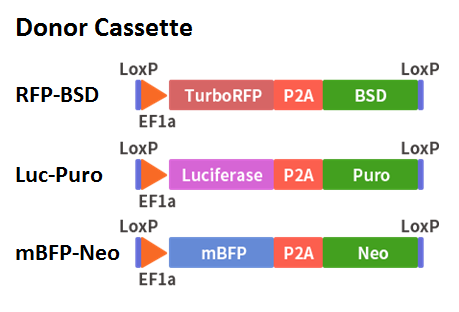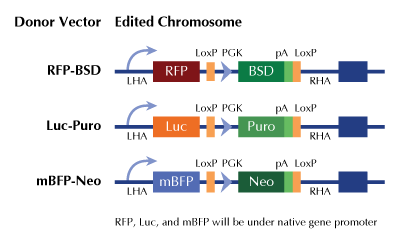MYD88 Human Gene Knockout Kit (CRISPR)
$1,657.00
4 Weeks*
| Product Data | |
| Format | 2 gRNA vectors, 1 Luciferase-Puro donor, 1 scramble control |
|---|---|
| Vector | Luciferase-Puro |
| Target Symbol | MYD88 |
| Locus ID | 4615 |
| Components |
KN202253G1, MYD88 gRNA vector 1 in pCas-Guide CRISPR vector KN202253G2, MYD88 gRNA vector 2 in pCas-Guide CRISPR vector KN202253LPD, donor DNA containing left and right homologous arms and Luciferase-Puro functional cassette. GE100003, scramble sequence in pCas-Guide vector |
| OTI Disclaimer | These products are manufactured and supplied by OriGene under license from ERS. The kit is designed based on the best knowledge of CRISPR technology. The system has been functionally validated for knocking-in the cassette downstream the native promoter. The efficiency of the knock-out varies due to the nature of the biology and the complexity of the experimental process. |
| Reference Data | |
| RefSeq | NM_001172566, NM_001172567, NM_001172568, NM_001172569, NM_002468, NM_001365877, NM_001365876 |
| UniProt ID | Q99836 |
| Synonyms | MYD88D |
| Summary | This gene encodes a cytosolic adapter protein that plays a central role in the innate and adaptive immune response. This protein functions as an essential signal transducer in the interleukin-1 and Toll-like receptor signaling pathways. These pathways regulate that activation of numerous proinflammatory genes. The encoded protein consists of an N-terminal death domain and a C-terminal Toll-interleukin1 receptor domain. Patients with defects in this gene have an increased susceptibility to pyogenic bacterial infections. Alternate splicing results in multiple transcript variants. [provided by RefSeq, Feb 2010] |
| Shipping | Ambient |
More linear donor DNA can be ordered separately
| Cat# | KN202253LPD |
| Description | 10 ug linear donor DNA for KN202253LP kit |
| Price | $515/€515 |
If you want to order 50ug, please order quantity of 5 for KN202253LPD
Other selection marker is available for donor DNA.
Please contact
techsupport@origene.com
for a custom quote.

Write Your Own Review
| Product Manuals |
| FAQs |
| SDS |
| SKU | Description | Size | Price | |
|---|---|---|---|---|
| GA103058 | MYD88 CRISPRa kit - CRISPR gene activation of human MYD88 innate immune signal transduction adaptor | 1 kit |
$1,657.00
|
|
| KN202253 | MYD88 - human gene knockout kit via CRISPR, HDR mediated | 1 kit |
$1,657.00
|
|
| KN202253BN | MYD88 - human gene knockout kit via CRISPR, HDR mediated | 1 kit |
$1,657.00
|
|
| KN202253RB | MYD88 - human gene knockout kit via CRISPR, HDR mediated | 1 kit |
$1,657.00
|
|
| KN402253 | MYD88 - KN2.0, Human gene knockout kit via CRISPR, non-homology mediated. | 1 kit |
$1,657.00
|
|
Citations
*Delivery time may vary from web posted schedule. Occasional delays may occur due to unforeseen
complexities in the preparation of your product. International customers may expect an additional 1-2 weeks
in shipping.

